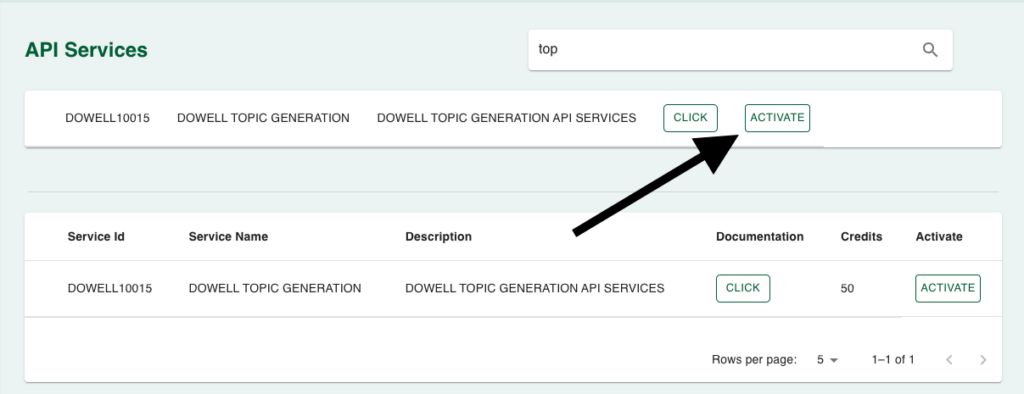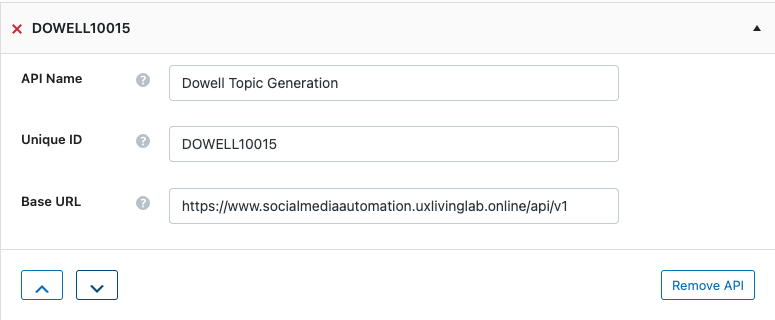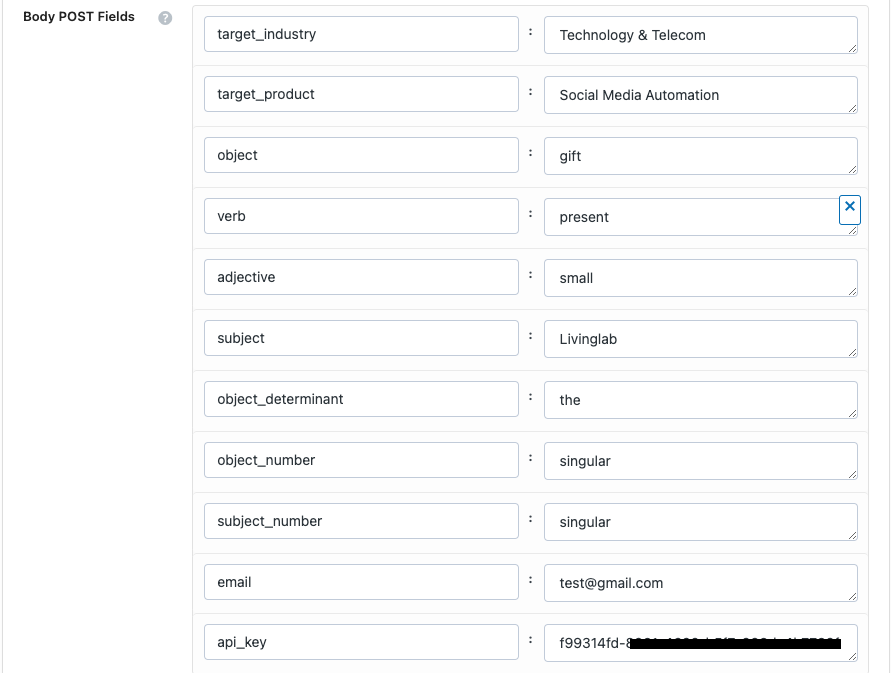Dowell Topic Generation API
Empower Your Brand’s Story with Dowell Topic Generation API

Dowell
Topic Generation API
Dowell Topic Generation API is a powerful tool that allows users to automatically generate informative and engaging topics for various applications. By leveraging advanced Artificial Intelligence techniques, this API enables users to obtain relevant and well-structured topics without the need for manual brainstorming or extensive research.
Key Features

Topic Generation:
Generate high-quality topics based on a given input or context.

Customization
Fine-tune the generated topics by adjusting parameters and specifying preferences.

Variety
Generate a diverse range of topics to suit different content types and domains.

Efficiency
Save time and resources by automating the topic generation process.

Postman Documentation
For detailed API documentation, including endpoint descriptions, request and response examples, and authentication details, please refer to the API documentation
Dowell Topic Generation API Demonstrative Scenarios
In the following scenarios, Dowell will furnish comprehensive instructions on obtaining the Service key and guide you through the steps to use the API. You’ll find examples in various formats such as Python, PHP, React, Flutter, and WordPress in the tabs below. Feel free to explore the examples in each tab for practical insights.
Dowell Topic Generation API Use Cases
Discover how our Topic Generation API revolutionizes content creation for blogs, SEO optimization, social media planning, and e-commerce. Learn how to effortlessly generate engaging and relevant content, driving traffic, boosting SEO rankings, and maximizing conversions. Watch our video to unlock the power of seamless content creation!
Frequently Asked Questions (FAQs) about Dowell Topic Generation API
1. What types of topics can I generate with Dowell Topic Generation API?
The API can generate a diverse range of topics to suit different content types and domains, ensuring versatility and relevance.
2. Can I customize the topics generated by the API?
Yes, you can fine-tune the generated topics by adjusting parameters and specifying preferences according to your requirements.
3. What types of topics can I generate with Dowell Topic Generation API?
The API can generate a diverse range of topics to suit different content types and domains, ensuring versatility and relevance.
4. How does Dowell Topic Generation API help in saving time and resources?
By automating the topic generation process, the API enables users to save time and resources that would otherwise be spent on manual brainstorming or research efforts.
5. What programming languages are supported for integrating with Dowell Topic Generation API?
The API supports integration with various popular programming languages including Python, PHP, React, Flutter, and WordPress and other Languages as well.
6. How can I obtain support if I encounter any issues with the API?
If you encounter any issues, have questions, or need assistance with Dowell Topic Generation API, you can contact the support team for prompt assistance. Contact us at Dowell@dowellresearch.uk
7. Does Dowell Topic Generation API require any prior AI knowledge to use?
No, you don’t need any prior AI knowledge to use the API. It’s designed to be user-friendly and accessible for users with varying levels of technical expertise.
8. How reliable is the topic generation process with Dowell Topic Generation API?
The API utilizes advanced AI techniques to ensure the reliability and accuracy of the generated topics, providing users with high-quality results consistently.
9. Can I integrate Dowell Topic Generation API with my existing applications or platforms?
Yes, you can integrate the API seamlessly with your existing applications or platforms to enhance their functionality with automated topic generation capabilities.
10. What other APIs does Dowell UX Living Lab provide besides Topic Generation?
Dowell UX Living Lab offers a wide range of APIs to enhance user experience and streamline various processes. To explore the full list of APIs available, including Dowell Email, Dowell Newsletter, Samanta Content Evaluator, and many more.
For more details and to explore the complete list of APIs provided by Dowell UX Living Lab, please visit our documentation page.
How To Get The API Key
- Access the Dowellstore website through this link: https://dowellstore.org and login. Once on the website, navigate to the API service section and activate the DOWELL TOPIC GENERATION API service. The API Key you need can be found in the dashboard, provided there as the service key. For more information follow the instructions in the videos found at the link below.
[How to get API key and redeem your voucher Step-by-Step Tutorial] - You can also find a step-by-step guide on how to get the API key and activate the API(s) by following this link Get The Service Key
- Then set the API KEY as part of the url parameter as shown below. Replace with your actual API key. The URL format: https://www.socialmediaautomation.uxlivinglab.online/api/v1/generate-sentences/
- Note: Make sure to activate your API from Dowell API Key System link provided above.

Python Example
This Python script employs the requests library to send a POST request to a sentence generation service. It customizes sentences based on a specified industry, product, and other parameters. Replace ‘your-api-key’ with your Dowell API key to tailor the generated sentences.
import requests
url = 'https://www.socialmediaautomation.uxlivinglab.online/api/v1/generate-sentences/'
payload = {
"target_industry": "Technology & Telecom",
"target_product": "Social Media Automation",
"object": "gift",
"verb": "present",
"adjective": "small",
"subject": "Livinglab",
"object_determinant": "the",
"object_number": "singular",
"subject_number": "singular",
"email": "test@gmail.com",
"api_key": "your-api-key" # Replace 'your-api-key' with your Dowell API key
}
response = requests.post(url, json=payload)
if response.status_code == 200:
data = response.json()
print(data)
else:
print(f"Request failed with status code: {response.status_code}")
PHP Example
In this PHP snippet, a POST request is made to a sentence generation service. The script customizes sentences according to a designated industry, product, and other criteria. Substitute ‘your-api-key’ with your Dowell API key to personalize the generated sentences.
"Technology & Telecom",
"target_product" => "Social Media Automation",
"object" => "gift",
"verb" => "present",
"adjective" => "small",
"subject" => "Livinglab",
"object_determinant" => "the",
"object_number" => "singular",
"subject_number" => "singular",
"email" => "test@gmail.com",
"api_key" => "your-api-key" // Replace 'your-api-key' with your Dowell API key
];
$options = [
'http' => [
'header' => "Content-Type: application/json\r\n",
'method' => 'POST',
'content' => json_encode($payload)
]
];
$context = stream_context_create($options);
$response = file_get_contents($url, false, $context);
if ($response !== false) {
$data = json_decode($response, true);
print_r($data);
} else {
echo "Request failed";
}
?>
React Example
This React component uses the fetch function to make the API call asynchronously. The useEffect hook ensures that the API call is made when the component mounts. Adjust the code within the if (response.ok) block to handle the response data as needed for your application.
import React, { useEffect } from 'react';
const YourComponent = () => {
const fetchData = async () => {
const url = "https://www.socialmediaautomation.uxlivinglab.online/api/v1/generate-sentences/";
const payload = {
"target_industry": "Technology & Telecom",
"target_product": "Social Media Automation",
"object": "gift",
"verb": "present",
"adjective": "small",
"subject": "Livinglab",
"object_determinant": "the",
"object_number": "singular",
"subject_number": "singular",
"email": "test@gmail.com",
"api_key": "c2636d98-4f43-4be1-9e3b-47cdfcbe832b",
};
try {
const response = await fetch(url, {
method: 'POST',
headers: {
'Content-Type': 'application/json',
},
body: JSON.stringify(payload),
});
if (response.ok) {
const data = await response.json();
console.log(data); // Replace with your logic for handling the response data
} else {
console.error(`Request failed with status code: ${response.status}`);
}
} catch (error) {
console.error('An error occurred:', error);
}
};
useEffect(() => {
fetchData();
}, []); // This ensures that the fetchData function is called when the component mounts
return (
<div>
{/* Your React component JSX */}
</div>
);
};
export default YourComponent;
Flutter Example
This Flutter function utilizes the http package to send a POST request to a sentence generation service. It crafts sentences based on a specified industry, product, and other parameters. To receive personalized sentences, replace ‘your-api-key’ with your Dowell API key.
// Inside your Flutter function
void generateSentences() async {
final url = 'https://www.socialmediaautomation.uxlivinglab.online/api/v1/generate-sentences/';
final response = await http.post(
Uri.parse(url),
headers: {'Content-Type': 'application/json'},
body: jsonEncode({
// other parameters...
"api_key": "your-api-key", // Replace 'your-api-key' with your Dowell API key
}),
);
if (response.statusCode == 200) {
final data = jsonDecode(response.body);
print(data);
} else {
print('Request failed with status code: ${response.statusCode}');
}
}
WordPress Example
Step 1: Set up the API name, unique ID and the base url(below). It’s a prerequisite to have WP-GET API plugin installed in your wordpress website

Step 2: Establish the API endpoint with the inclusion of the API key, and configure the request body to contain the required POST fields.


Step 3: Test the endpoint to obtain a jQuery response from the API. Ensure that the API is functioning correctly by sending a test request and examining the response.

 Views Today : 1
Views Today : 1 Views Last 30 days : 800
Views Last 30 days : 800 Views This Year : 1302
Views This Year : 1302 Total views : 6912
Total views : 6912